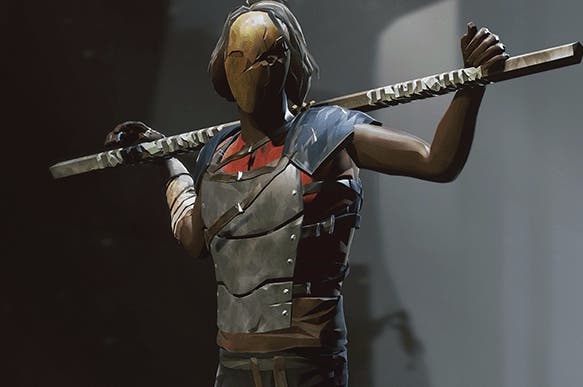Absolver review
Kingdom combo.
Absolver isn't a Dark Souls game. It seems wise to state that up front, because for its first few hours Absolver manages a very good impression of a Dark Souls game, albeit one that has traded its Covenants for martial art schools, its "jolly cooperation" for Jeet Kune Do. There's the world, to begin with - the crumpled remains of a splendid civilisation, flickering eerily between timeframes and dimensions, where masked Prospects do pilgrimage in the hope of attaining the mantle of an Absolver. There are the altars that, like Dark Souls' legendary bonfires, peg down exploration of that world - geysers of glowing stone where you can meditate to access equipment and ability inventories together with arena PvP.
There's the mildly punitive level-up system, whereby you only keep the XP from each punch-up if you survive it, and that taste for couching backstory in the form of cursory item descriptions. There's the persistent online, with other players dropped into your session ad hoc as you roam, and above all else, there's the importance of stamina, which is used for attacks, evasive manoeuvres and blocking. Exhaust yourself flailing at an opponent's crossed elbows, and the next strike that connects will knock your guard wide open.
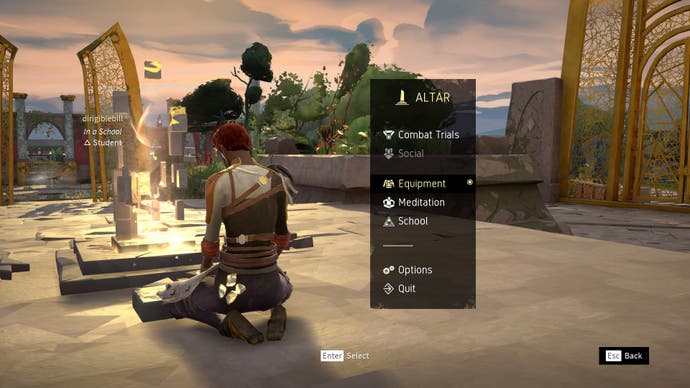
To think of Absolver as a Dark Souls game, however, is to cramp its style. If six-head Parisian developer Slocap has borrowed a few structural motifs from the Souls games, it has set its sights on something much leaner and possibly, even more arduous - a spartan yet beautifully involved melee fighting game that only resembles a Soulslike from afar. The landscape, for one thing, isn't as vast and knotty as it appears. The vistas are incredible, each twist of the road exposing yet another heap of ruined architecture - temples ground together like teeth, staircases choked by vegetation, towers carved in half to reveal storerooms and observatories. The game's lightly textured art style does a fine job of conveying the material and social strata of a long-departed culture. This is, amongst other things, one of the few games that makes precious metal look genuinely precious, gleaming hypnotically amid the dust of a royal library.
As captivating as the backdrops invariably are, however, the game's actual navigable expanse consists of a dozen small areas linked by a single path, plus a few stumpy avenues where you'll find boss encounters or equipment-filled cairns. This isn't an exquisitely folded labyrinth in the Souls tradition - once you've punched your way to its summit, a process that shouldn't take longer than a couple of evenings, Absolver's entire landscape can be traversed in moments. There are no demons or dragons to discover, either, just an endlessly regenerated population of whip-thin, silent pugilists in scraps of cloth and leather, slumped in the same locations awaiting your arrival, scaling up in terms of stats and moveset as your skills progress. And where the Souls games embroil you in a quest to preserve or purge a vanishing reality, Absolver's narrative thrust is bruisingly down to earth: you are here simply to become the very best martial artist you can be, and at the heart of that is your customisable combat deck.
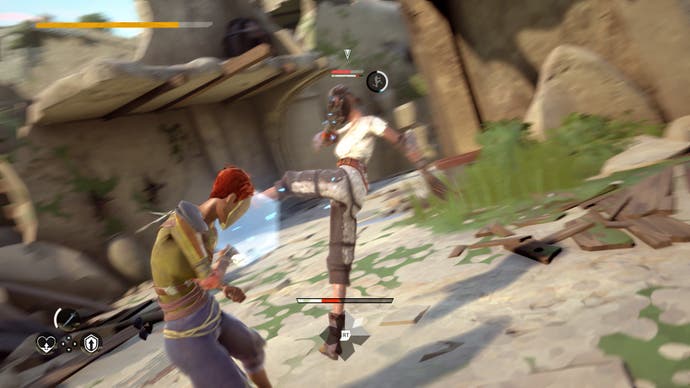
Seemingly inspired by Clover Studio's PlayStation 2 prizefighter God Hand, Absolver's combat deck system is a thing of wonder. Decks consist of four sequences of up to three moves, with new move slots opening up as you gain levels, all performed with the same button but mapped to one of four stances, which are switched using right trigger plus right analogue stick. Each individual move ends in a certain stance, so by slotting the right moves into the end of each sequence, you can arrange for them to flow into each other continuously while your stamina lasts - gentlemanly hooks and jabs giving way to florid, drunken master double-punches, pulverising axe kicks and meaty uppercuts.
What's more, once you've linked each sequence together you can unleash the full force of your deck from any stance, creating four distinct variations on the same, epic combo. It's a focused yet flexible system - if you're getting punished for starting off with a flurry of straight punches, why not switch to your rear stance and open with an ankle sweep? There's also a fifth sequence of four "alternate" attacks, performed with a different button. Stocked by default with slow, powerful moves, these allow for more immediate reactions to particular gambits - a brutal elbow drop after sliding around one of your opponent's big finishers, for instance. The cherries on the cake are the weapons, conjured from the ether with D-pad up. Limited to swords and gauntlets at the time of writing, these offer up another layer of customisable combos, but watch out - swords can be jolted from your grip, potentially handing the advantage to your opponent.
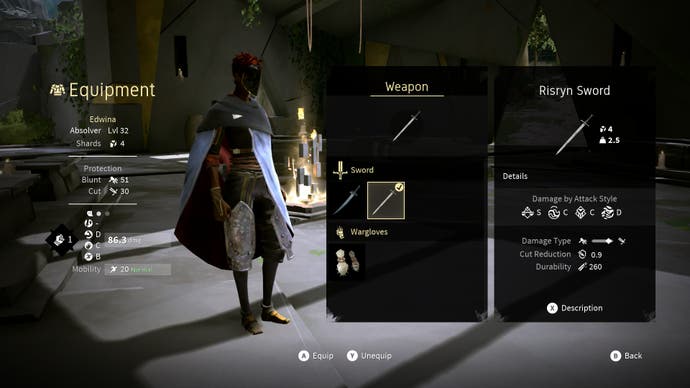
Absolver packs an eye-watering 180 moves in all, each learned by blocking or evading the assaults in question until you've filled up a little XP wheel. This process can be tedious - if you want to hoover up every last move, you'll need to drag out a few fights with less challenging opponents. But it's an elegantly compressed piece of pedagogy, on the whole, because mastering each jaw-rattling sally also means mastering the art of defending against it. You'll learn moves faster if you use your martial art style's signature evasive ability, rather than bunkering up - Windfall players can bob and weave around blows, Kahlt players can soak up and recover damage by counterattacking, and Forsaken players can parry it outright.
The moves themselves are snappily recreated and lock together viciously, no matter the order of execution: collecting and trying them out is every bit as addictive as harvesting Pokémon. Some techniques have RPG-style status effects, like cancelling certain defensive abilities; others double as evasive techniques, like the reverse ankle sweep that ducks your character under incoming fire; all are worthy of extended contemplation. There's a delightful element of prophetic mind-reading to building your combo - working out where in each sequence an opponent is likely to risk a sideways dodge, for example, and doing your best to answer this with a roundhouse kick. If you're fighting a player you know in PvP, of course, there's the opportunity to get seriously nerdy about how your combat decks compare. If you really think you've put together an unbeatable formula, you can even set up your own multiplayer combat school (well, once you've levelled up enough), allowing disciples to use your custom deck - the foundation, you'd hope, for an enduring and sophisticated competitive scene.
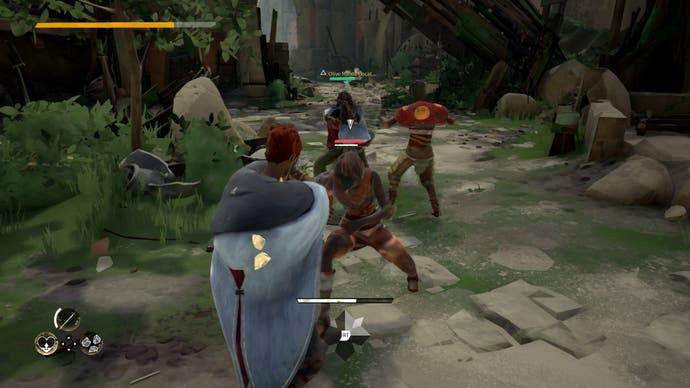
That's providing Absolver can overcome its rough edges, the most forgivable of which concern NPC behaviour. Enemies will only engage you inside certain areas - get pushed outside them, which is easy enough when you're facing off against a group, and your foes will turn tail and scurry back to their positions. While a welcome trait when you're just trying to run through an area, this often scuppers the satisfaction of a good fight - the lines around aggro-zones are perhaps a little too stark. Absolver's mob tactics are also somewhat cheap and overwhelming, next to the clean clockwork of its 1v1 sparring. As in the Arkham games, the lock-on system allows you to lash out towards enemies other than your target, keeping underlings at bay while you whittle down a boss, but the AI is annoyingly fond of dirty shots from the rear or side, and the camera often struggles to keep everybody in frame when you're battling indoors. It feels like the problem of group fights is behind the introduction of certain magical abilities, which are charged in battle - many are designed to make crowd control less of a headache, such as AoE blasts that tucker foes out, or spells that reduce the knockback you take.
The real make-or-break factor, though, will be the game's networking performance, which has veered from awful to decent in the week leading up to release. At its worst, lag has rendered the game unplayable, and while the past 12 hours have been reasonably hitch-free, there's still a fleeting judder at the time of writing whenever another player enters your session. The competitive match-making could possibly also do with some tuning - it frequently set me up with players twice my level, though this may of course reflect smaller server populations before launch. The levelling system has a soft cap, with the gains from each attribute point you assign decreasing at higher ranks, but a level 60 warrior armed with a gargantuan stamina reserve and the most flamboyant moves will typically make mincemeat of anybody a dozen levels her junior.
Providing these are, indeed, teething troubles rather than lingering flaws, Absolver should prove a resilient addition to the pantheon of serious melee combat games - distinguished by the heft and charisma of its animations, the depth and delicacy of its combo system, and the peculiar grandiosity of its world. Far from an undernourished take on Souls, it feels like a hermitage of sorts for the more poetic breed of warrior, a sanctuary where you can be assured of both ravishing, mournful scenery and a bloody good fight.
